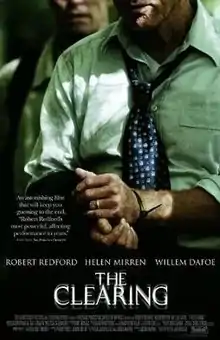The Clearing (film)
The Clearing is a 2004 drama film and the directorial debut of film producer Pieter Jan Brugge. The film is loosely based on the real life kidnapping of Gerrit Jan Heijn that took place in the Netherlands in 1987. The screenplay was written by Justin Haythe.
| The Clearing | |
|---|---|
 Theatrical release poster | |
| Directed by | Pieter Jan Brugge |
| Produced by | Pieter Jan Brugge Jonah Smith Palmer West |
| Written by | Pieter Jan Brugge Justin Haythe |
| Starring | Robert Redford Helen Mirren Willem Dafoe |
| Music by | Craig Armstrong |
| Cinematography | Denis Lenoir |
| Edited by | Kevin Tent |
Production company | Blue Ridge Motion Pictures Fox Searchlight Pictures Mediastream Dritte Film GmbH & Co. Beteiligungs KG Thousand Words Wildwood Enterprises |
| Distributed by | Fox Searchlight Pictures |
Release date |
|
Running time | 95 minutes |
| Country | Germany United States |
| Language | English |
| Box office | $12.5 million[1] |
Plot
Wayne Hayes (Robert Redford), and his wife Eileen (Helen Mirren) are living the American dream in a wealthy Pittsburgh suburb, having raised two children (Alessandro Nivola, Melissa Sagemiller) and built up a successful business from scratch. He is looking forward to a peaceful retirement with Eileen. Everything changes when Wayne is kidnapped in broad daylight by a former employee, Arnold Mack (Willem Dafoe). While Wayne tries negotiating with the kidnapper, Eileen works with the FBI to try to secure her husband's release. During the investigation, Eileen learns that Wayne has continued an extramarital affair that he promised to end months previously.
Eileen is eventually instructed to deliver the ransom to the kidnapper, but Arnold takes the money without returning her husband; Arnold murdered Wayne the day of the kidnapping. Although Eileen's ordeal takes place over the course of a week, the film is edited to show Wayne's kidnapping as if it was happening at the same time.
Arnold is eventually caught when he begins to spend the ransom money in the neighborhood where he lives. At a local grocery store, he uses a $100 bill to make a purchase. The store manager calls authorities and verifies the serial number on the $100 bill is on a watch list the FBI distributed to local businesses. During questioning Arnold is asked if he wanted to be caught, and he admits that the kidnapping was to get money for his depressed wife, but it took him all day to bring himself to kill Wayne and he could not live with the guilt of his crime. In the end, Eileen receives a loving note written by Wayne before his death.
Cast
- Robert Redford – Wayne Hayes
- Helen Mirren – Eileen Hayes
- Willem Dafoe – Arnold Mack
- Alessandro Nivola – Tim Hayes
- Matt Craven – Agent Ray Fuller
- Melissa Sagemiller – Jill Hayes
- Wendy Crewson – Louise Miller
- Larry Pine – Tom Finch
- Diana Scarwid – Eva Finch
Locations
The film was shot in and around Asheville, North Carolina and in downtown Pittsburgh.[2]
Reception
The film has received mixed reviews. According to Roger Ebert, writing in the Chicago Sun-Times, it "doesn't feel bound by the usual formulas of crime movies. What eventually happens will emerge from the personalities of the characters, not from the requirements of Hollywood endings."[3] Peter Travers of Rolling Stone wrote, "The pleasures of this endeavor, directed with a keen eye for detail by Pieter Jan Brugge, come from what the actors bring to the material."[4]
Ty Burr, in the Boston Globe, felt that the film had a "lack of emotion" and "could have been more than it is".[5] M. Torreiro, in the Spanish newspaper El País, described the film a "tense thriller, cramped and made of downtime and sensations on the limit, a strange film."[6]
References
- "The Clearing (2004)". Box Office Mojo. Retrieved May 13, 2016.
- https://www.pghfilm.org/screening-room/pittsburgh-filmography/?fwp_screening_room_search=The%20Clearing
- Ebert, Roger (2 July 2004). "The Clearing Movie Review & Film Summary (2004); Roger Ebert". Suntimes. Retrieved 30 July 2013.
- Peter Travers (2 July 2004). "The Clearing; Movie Reviews". Rolling Stone. Retrieved 30 July 2013.
- "Lack of emotion clutters 'Clearing'". The Boston Globe. 2 July 2004. Retrieved 30 July 2013.
- "La sombra de un secuestro (2004)". Filmaffinity.com. Retrieved 9 October 2017.